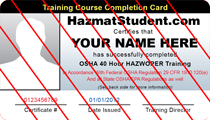| Save for a Rainy Day | Working Outdoors in the Rain |
Rainy working conditions can create increased risk of injuries and accidents on the job. The rain can cause surfaces to be become slick and field of vision to be impaired. Appropriate equipment and clothing need to be chosen for the weather conditions and the job at hand.
To help keep safe while working in the rain, there a number of preventative measures workers can take:
Job-Site: Be aware that the risk of slips and falls is increased in rainy weather. Work consciously and cautiously to avoid slipping and other weather-related dangers. Take precautions to ensure your view is not obstructed. Work areas should be well-lit.

Clothing: Ensure you wear rain gear suitable for the conditions and work to be performed. Waterproof jackets and pants may be the best choice for extended outdoor work, but proper fit is important to ensure you can perform your job safely. Rain gear that is made of polyester or nylon provides the benefits of being lightweight on the body and easy to transport, but it’s not completely waterproof. PVC rain gear is waterproof, but it’s bulkier and heavier. Wearing synthetic fibers under rain gear can help keep you warm even if you do end up getting wet. Water repellent can applied to clothing, boots, and gloves to increase your protection from the rain. Reflective and bright-colored clothing or vests should be worn to ensure you can be seen when visibility has been impacted by the weather.
Boots & Gloves: Boots should be waterproof and include rubber, non-slip soles with grips. Boots should cover the ankle, and pants should be worn over the boot, so water does not have an entry point into the shoe. Review your waterproof glove options to match the needs of the job. Identify whether you need gloves to provide additional warmth, to be breathable, to be non-bulky, or to provide a non-slip grip, and choose the right gloves to ensure you can work safely and comfortably.
Equipment: In the rain, on-the-job tools should have non-slip features. Electrical equipment should not be used in wet conditions.
Rainy weather increases risks to employees who work outdoors. Planning ahead and taking precautions on the job-site can help mitigate those risks and increase worker safety.



